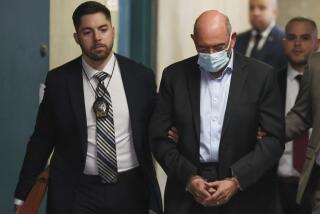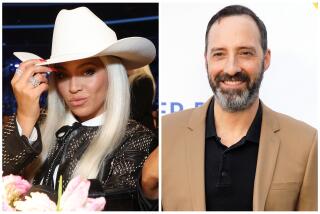Whitewater Witness Hale Admits to Lying
LITTLE ROCK, Ark. — The government’s key Whitewater witness, David Hale, who has been portrayed by the defense as a persistent liar, acknowledged Tuesday that he had lied to a federal judge two years ago when he agreed to a plea bargain with the government.
Hale’s admission came during his fourth day under cross-examination by attorneys for defendants Jim Guy Tucker, the governor of Arkansas, and Susan and James B. McDougal, President Clinton’s investment partners in the Whitewater resort development.
A former municipal judge, Hale has testified that in the mid-1980s he entered into a criminal conspiracy involving Tucker, the McDougals and Clinton. But the defense contends that Hale fabricated the story in an effort to win leniency for his own crimes from independent counsel Kenneth W. Starr, who is investigating whether the Clintons benefited improperly from their Whitewater investment.
In an effort to undermine Hale’s credibility, the defense has cited numerous instances in which he lied about his business dealings with the defendants and with law enforcement officials.
Asked specifically about a statement he made in response to a question from Judge Stephen Reasoner on the day he entered his plea in U.S. District Court in March 1994, he admitted that his answer was false.
He recalled that he answered, “I don’t believe so,” when Reasoner asked him whether any companies he owned had benefited from the $900,000 he had obtained fraudulently from the Small Business Administration. On Tuesday, he said that some of the money did go to a company he owned.
But Hale sought to minimize his false statement to Reasoner. “I was scared and I don’t know what I said,” he said.
Likewise, prosecutor Ray Jahn told reporters outside the courtroom that Hale’s statement to Reasoner was an understandable “mistake.”
Bobby McDaniel, attorney for Susan McDougal, disagreed.
“It’s perjury and his plea agreement does not cover it,” McDaniel told reporters. “There’s no way that could be a mistake.”
Nevertheless, while McDaniel conceded that he does not expect the independent counsel to charge Hale with perjury, he asserted that this and other contradictions in Hale’s statements have been sufficient to impeach him as a credible witness for the prosecution in this trial.
“The jury got an opportunity to see that David Hale is not credible,” McDaniel said, referring to the results of Tuesday’s cross-examination.
During four days of cross-examination, Hale repeatedly has resisted questions from the defense attorneys that might contradict his own story of how he, Tucker, James McDougal and Clinton conspired to defraud McDougal’s savings and loan as well as Hale’s government-backed small business investment corporation.
He also has been reluctant to acknowledge any falsehoods, even when presented with the evidence.
For example, he acknowledged under questioning by McDaniel that he had drafted minutes of a board of directors meeting that never took place but he refused to acknowledge that it was--as McDaniel described it--”a fabrication.”
“This document is a total fabrication, isn’t it?” McDaniel asked.
“It really happened,” Hale replied. Then he sheepishly added: “The people weren’t there and there was no meeting.”
The defense also has pointed to numerous contradictions in statements that Hale has made to the government, to the news media and on the witness stand. Among other things, defense lawyers have emphasized that Hale made no mention of these alleged crimes when he was interviewed initially by the FBI in 1989.
A key event in Hale’s story is a meeting that he has described in November 1985, with Tucker and McDougal. He claims that the financial conspiracy was hatched at that meeting.
But on the witness stand, Hale has recounted two slightly different versions of that meeting.
Initially, Hale said that McDougal proposed the conspiracy during that meeting as a way to assist members of the Arkansas Democratic “political family” pay off debts and cover up previous illegal activities.
On Monday, however, he said that McDougal may have made that statement at another meeting.
But under cross-examination Tuesday, Hale reverted to his original version--saying that McDougal made that statement at the meeting in which they first discussed the scheme.
More to Read
Sign up for Essential California
The most important California stories and recommendations in your inbox every morning.
You may occasionally receive promotional content from the Los Angeles Times.










